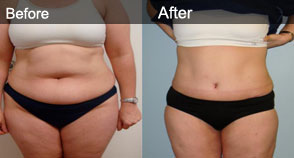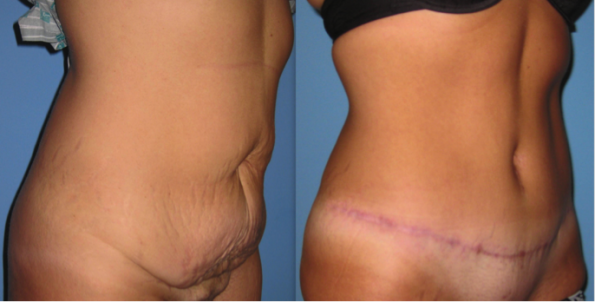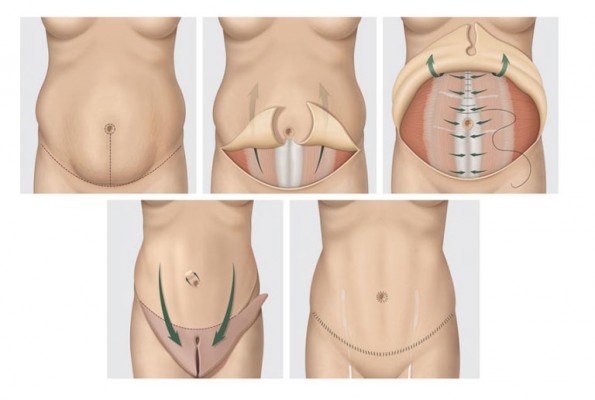
Tummy tuck surgery, also known as abdominoplasty, removes excess fat and skin and, in most cases, restores weakened or separated muscles creating an abdominal profile that is smoother and firmer.
A flat and well-toned abdomen is something many of us strive for through exercise and weight control. Sometimes these methods cannot achieve our goals.
Even individuals of otherwise normal body weight and proportion can develop an abdomen that protrudes or is loose and sagging. The most common causes of this include:
- Aging
- Heredity
- Pregnancy
- Prior surgery
- Significant fluctuations in weight
Tummy tuck candidates
In general, you may be a good tummy tuck candidate if:
- You are physically healthy and at a stable weight
- You have realistic expectations
- You are a non-smoker
- You are bothered by the appearance of your abdomen
Tummy tuck surgery is a highly individualized procedure and you should do it for yourself, not to fulfill someone else’s desires or to try to fit any sort of ideal image.
Tummy tuck recovery
During your tummy tuck recovery, dressings or bandages may be applied to your incisions, and you may be wrapped in an elastic bandage or a compression garment to minimize swelling and support your abdomen as it heals following surgery.
Small, thin tubes may be temporarily placed under the skin to drain any excess blood or fluid that may collect.
You will be given specific instructions that may include:
- How to care for the surgical site and drains
- Medications to apply or take orally to aid healing and reduce the potential for infection
- Specific concerns to look for at the surgical site or in your general health
- When to follow up with your plastic surgeon
Be sure to ask your tummy tuck surgeon specific questions about what you can expect during your individual recovery period:
- Where will I be taken after my surgery is complete?
- What medication will I be given or prescribed after surgery?
- Will I have dressings/bandages after surgery? When will they be removed?
- When will the stitches be removed?
- How will I bathe?
- How long will I wear the pressure garment?
- When can I resume normal activity and exercise?
- When do I return for follow-up care?

Tummy tuck scarring
In women who have undergone cesarean section, the existing scars may be incorporated into the new scar.
The tummy tuck scar may take several months to a year to fade as much as it will.
Although good results are expected from your procedure, there is no guarantee. In some situations, it may not be possible to achieve optimal results with a single surgical procedure and another surgery may be necessary.
Following your physician’s instructions is essential to the success of your surgery.
It’s important that the surgical incisions are not subjected to excessive force, swelling, abrasion, or motion during the time of healing. Your doctor will give you specific instructions on how to care for yourself.
Tummy tuck risks and safety information
The decision to have plastic surgery is extremely personal, and you’ll have to decide if the benefits will achieve your goals and if the risks and potential complications of tummy tuck surgery are acceptable.
You will be asked to sign consent forms to ensure that you fully understand the procedure and any risks.
Tummy tuck risks include:
- Anesthesia risks
- Bleeding
- Infection
- Fluid accumulation (seroma)
- Poor wound healing
- Skin loss
- Numbness or other changes in skin sensation
- Skin discoloration and/or prolonged swelling
- Unfavorable scarring
- Recurrent looseness of skin
- Fatty tissue found deep in the skin might die (fat necrosis)
- Deep vein thrombosis, cardiac and pulmonary complications
- Asymmetry
- Suboptimal aesthetic result
- Possibility of revisional surgery
- Persistent pain
These risks and others will be fully discussed prior to your consent. It’s important that you address all your questions directly with your plastic surgeon.

Preparing for tummy tuck surgery
In preparing for tummy tuck surgery, you may be asked to:
- Get lab testing or a medical evaluation
- Take certain medications or adjust your current medications
- Stop smoking
- Avoid taking aspirin, anti-inflammatory drugs and herbal supplements as they can increase bleeding
A tummy tuck may be performed in an accredited office-based surgical facility, licensed ambulatory surgical center, or a hospital.
If your tummy tuck is performed on an outpatient basis, be sure to arrange for someone to drive you to and from surgery and to stay with you for at least the first night following surgery.

0 comments on “Tummy Tuck Surgery”Add yours →